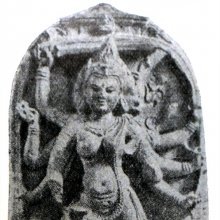Salt, Salty: 2 definitions
Introduction:
Salt means something in Hinduism, Sanskrit. If you want to know the exact meaning, history, etymology or English translation of this term then check out the descriptions on this page. Add your comment or reference to a book if you want to contribute to this summary article.
Images (photo gallery)
(+1 more images available)
In Hinduism
Yoga (school of philosophy)
Source: ORA: Amanaska (king of all yogas): A Critical Edition and Annotated Translation by Jason BirchSalt can denoted by the Sanskrit terms Lavaṇa or Kṣāra, according to the Amanaska Yoga treatise dealing with meditation, absorption, yogic powers and liberation.—Accordingly, as Īśvara says to Vāmadeva: “[...] [Now], I shall define the nature of that highest, mind-free absorption which arises for those devoted to constant practice. [...] As salt (lavaṇa) put into water dissolves gradually, so the mind as well dissolves [thus] in Brahma by means of the practice [of absorption]. As salt by contact with water becomes water, so the mind by contact with Brahma becomes Brahma. [...]”.

Yoga is originally considered a branch of Hindu philosophy (astika), but both ancient and modern Yoga combine the physical, mental and spiritual. Yoga teaches various physical techniques also known as āsanas (postures), used for various purposes (eg., meditation, contemplation, relaxation).
Ayurveda (science of life)
Source: ORA: Amanaska (king of all yogas): (ayurveda)The Salty taste is denoted by the Sanskrit term Lavaṇa-Rasa, according to the Kāśyapasaṃhitā (Khilasthāna, verse 9.43-45ab) in a chapter on abdominal swelling caused by vitiation of the blood.—Accordingly, “Listen to the cause of that which produces the cravings [of a seemingly pregnant woman with raktagulma]. Generally, there is desire for those tastes which cause an increase of the bodily constituents because of the true similarity of their origin. [When] the vitiated blood has a Vāta or Pitta [imbalance] and is accumulating, it fuels desire for tastes such as [those which are] acrid, sour, salty (lavaṇa) and so on”.

Āyurveda (आयुर्वेद, ayurveda) is a branch of Indian science dealing with medicine, herbalism, taxology, anatomy, surgery, alchemy and related topics. Traditional practice of Āyurveda in ancient India dates back to at least the first millenium BC. Literature is commonly written in Sanskrit using various poetic metres.
See also (Relevant definitions)
Starts with (+8): Calti, Salt and pepper grass, Salt bush, Salt couch, Salt fish, Salt grass, Salt heliotrope, Salt marsh aster, Salt marsh cord grass, Salt marsh fleabane, Salt meadow hay, Salt rabbit brush, Salt water, Salt water couch, Salt water mangrove, Salt-and-oil tree, Salt-meadow cord grass, Saltanata, Saltbush, Saltlover.
Ends with: Rock salt.
Full-text (+1575): Lavana, Lavanika, Kshara, Saindhava, Lavanita, Manimantha, Lavaṇoda, Loṇa, Lavanodaka, Saindhavaghana, Pancalavana, Shulanashana, Salanga, Bilinu, Sauvarcala, Namakina, Vitalavana, Airina, Audbhijja, Lauhasara.
Relevant text
Search found 254 books and stories containing Salt, Salty, Salted; (plurals include: Salts, Salties, Salteds). You can also click to the full overview containing English textual excerpts. Below are direct links for the most relevant articles:
Kavyamimamsa of Rajasekhara (Study) (by Debabrata Barai)
Part 7.6 - Poetic conventions regarding to the Oceans and Water < [Chapter 5 - Analyasis and Interpretations of the Kāvyamīmāṃsā]
Part 8.2 - Rājaśekhara’s concepts of Seven Mahādvīpas (islands) < [Chapter 5 - Analyasis and Interpretations of the Kāvyamīmāṃsā]
Part 8.7 - The region of Uttarāpatha (northern part) < [Chapter 5 - Analyasis and Interpretations of the Kāvyamīmāṃsā]
The Markandeya Purana (Study) (by Chandamita Bhattacharya)
Used and Prohibited Food and Vegetables for Śrāddha Ceremony < [Chapter 2]
Foods and Oṣadhīs Used in Sacrificess (Yajñiya) < [Chapter 2]
Food that are not to be Stolen < [Chapter 2]
Bhesajjakkhandhaka (Chapter on Medicine) (by Hin-tak Sik)
Medicines (i): Salts (Loṇa/Lavaṇa) < [Chapter 4 - Medicinal Substances in the Chapter on Medicine]
Internal Medicine (b): Wind Diseases < [Chapter 5 - Diseases and Treatments in the Chapter on Medicine]
Medicines for the Duration of one’s Life (Introduction) < [Chapter 4 - Medicinal Substances in the Chapter on Medicine]
Rasa Jala Nidhi, vol 3: Metals, Gems and other substances (by Bhudeb Mookerjee)
Introduction to Salts (lavana)
Part 2 - Alkaline substance (2): Usara or Sora (salt-petre) < [Chapter XXVIII - Kshara (akalis)]
Charaka Samhita (English translation) (by Shree Gulabkunverba Ayurvedic Society)
Chapter 7 - Complications of Enema (basti-vyapad-siddhi) < [Siddhisthana (Siddhi Sthana) — Section on Successful Treatment]
Chapter 27l - The section on the articles used in cooked foods (Aharayogi) < [Sutrasthana (Sutra Sthana) — General Principles]
Chapter 15 - The therapeutics of Assimilation disorders (grahani-dosha-cikitsa) < [Cikitsasthana (Cikitsa Sthana) — Section on Therapeutics]
The Garuda Purana (by Manmatha Nath Dutt)
Chapter CCXVI - Medical treatment of the diseases of cows, etc. < [Dhanvantari Samhita]
Chapter CXCVI - Therapeutic properties of drugs < [Dhanvantari Samhita]
Chapter CXCII - Medicinal recipes of inffalible effcacies < [Dhanvantari Samhita]
Related products
(+41 more products available)











